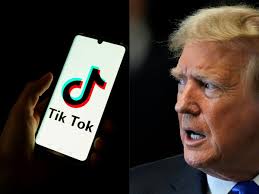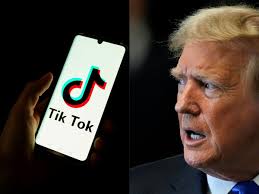
The conflict between TikTok and the U.S. government has reignited as President-elect Donald Trump takes a surprising stance, urging the Supreme Court to delay enforcing a law that mandates ByteDance, TikTok's Chinese parent company, to sell the app to an American entity or face a nationwide ban. The request, Trump argues, is intended to provide his incoming administration time to pursue a “political resolution.” This unexpected shift contrasts with his 2020 efforts to ban TikTok, showcasing the app’s evolving political and cultural significance in the United States.
Trump’s 2020 Crusade Against TikTok
The current controversy is deeply rooted in Trump’s earlier attempts to address perceived threats posed by TikTok. In 2020, Trump signed executive orders to ban TikTok and WeChat, citing concerns over Chinese government access to U.S. user data. These orders sparked legal challenges, with TikTok arguing that its U.S. operations, including data storage and content moderation, were independent of Chinese government influence. ByteDance proposed a partnership with Oracle and Walmart to address these concerns, but the deal was never finalized.
This earlier battle framed TikTok as a symbol of broader tensions between the U.S. and China over technology and data sovereignty. Now, as Trump shifts from antagonist to potential ally, the narrative underscores TikTok’s efforts to navigate political turbulence while maintaining its U.S. user base, which has surpassed 170 million.
The Current Legal and Political Battle
The law in question, passed by Congress in April, requires TikTok to divest from ByteDance by January 19, 2025, or face a ban. The Justice Department maintains that ByteDance’s ties to China pose national security risks, a sentiment echoed by many lawmakers and state attorneys general. Free speech advocates, however, argue that such measures set a dangerous precedent, likening the ban to censorship practices in authoritarian regimes.
Trump’s latest involvement adds a complex layer. While his legal team has stated that the president-elect takes no position on the law's merits, his request for a delay emphasizes the need for a political, rather than strictly judicial, resolution. This approach signals potential openness to negotiation with ByteDance, reflecting the app’s growing integration into American political and cultural discourse.
TikTok’s Defense: A Question of Independence
TikTok has repeatedly denied allegations of undue Chinese influence, pointing to its U.S.-based data storage on Oracle servers and its content moderation policies managed domestically. CEO Shou Zi Chew has sought to reassure lawmakers and the public, emphasizing the app’s operational independence and commitment to user safety.
Despite these efforts, TikTok remains a focal point in the broader U.S.-China rivalry. Critics argue that the app’s Chinese ownership inherently poses risks, while supporters see the ban as an overreach that undermines free speech and innovation.
Political Calculations: Trump’s Changing Tone
Trump’s evolving position on TikTok highlights the app’s political utility. During his presidential campaign, Trump acknowledged the platform’s influence, noting the billions of views his content received. This recognition may explain his current reluctance to endorse an outright ban, as TikTok increasingly serves as a tool for political engagement and outreach.
Meeting with TikTok CEO Shou Zi Chew in December, Trump expressed a “warm spot” for the platform, suggesting a willingness to explore solutions that allow it to continue operating in the U.S. This pragmatism contrasts with his earlier hardline stance and aligns with broader Republican concerns about overregulation stifling innovation.
Global Implications: A Precedent for Other Nations
The outcome of this battle has global implications, as countries worldwide grapple with balancing national security, economic interests, and digital sovereignty. India, for instance, banned TikTok in 2020 alongside dozens of other Chinese apps, citing similar security concerns. Meanwhile, the European Union continues to scrutinize TikTok’s data practices, reflecting the platform’s contested role in the global digital economy.
The U.S. case also highlights the growing importance of cross-border data governance frameworks. As nations debate the regulation of platforms like TikTok, they must navigate the complexities of globalization, technological interdependence, and geopolitical competition.
The Supreme Court’s Role: A Decision with Broad Consequences
The Supreme Court’s upcoming hearing on January 10 will be pivotal. A ruling to uphold the divest-or-ban law could force ByteDance to accelerate its search for a buyer or risk losing access to the lucrative U.S. market. Conversely, a decision to strike down the law would strengthen TikTok’s position and potentially limit future efforts to regulate foreign-owned tech platforms.
For Trump, the court’s decision could shape his administration’s early agenda, either providing an opportunity for diplomatic engagement or necessitating a more aggressive regulatory approach.
TikTok as a Battleground for Larger Issues
The TikTok controversy reflects deeper tensions between national security, free speech, and the globalized nature of technology. As the U.S. government, tech companies, and advocacy groups debate the platform’s future, the case underscores the challenges of regulating digital platforms in an era of geopolitical competition.
Trump’s shifting stance on TikTok illustrates the complexities of balancing these competing interests. Whether through political resolution or judicial mandate, the outcome will have far-reaching implications for U.S.-China relations, the tech industry, and the future of digital governance.
In this ever-evolving saga, TikTok stands not just as a social media platform but as a symbol of the intersection between technology, politics, and global power dynamics. The decisions made in the coming weeks will resonate far beyond the app’s 170 million U.S. users, shaping the digital landscape for years to come.
(Source:www.nbcnews.com)














